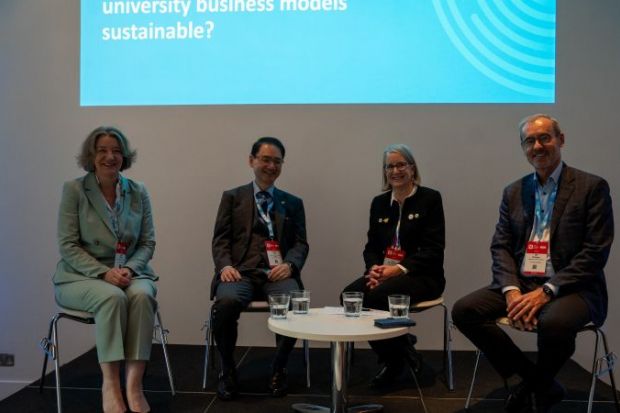Global university leaders have warned that their financial models have never faced greater threats but acknowledged that they must take care not to “talk down” their institutions too much while addressing those challenges.
Vice-chancellors addressing the Times Higher Education World Academic Summit said that they had already made significant operational efficiencies and warned that it would only get harder to make further savings as government policies continued to severely limit income-generating opportunities, but they held out some hope that artificial intelligence could help to reduce costs and improve productivity.
Karen O’Brien, vice-chancellor of Durham University, said her institution’s “very high-touch” system of student support, based on a network of colleges and with significant investment in bursaries, was “very difficult to sustain in the current financial circumstances”, but was nonetheless an important part of its offer to learners.
She said Durham was conducting a significant estates consolidation and had made a range of other back-office efficiencies. While it was now having to “think quite profoundly about [its] operating model”, she said the reason why students chose Durham was “that reputation for quality, for a university where you will come and people will know you by your name”.
“What could get lost in an operational transformation is the very thing that makes us financially sustainable, so it is a very difficult line to walk,” said Professor O’Brien, who has led Durham since the start of 2022.
“I’m trying to maintain and preserve quality and the areas where we have a reputation for quality, while at the same time recognising that we simply cannot afford the overhead that we currently have.”
Bill Flanagan, president of the University of Alberta, described how in the immediate aftermath of his appointment in July 2020 he had to find savings of C$110 million (£61.5 million) after the provincial government cut his institution’s public funding by a third.
This was achieved via a wide-ranging programme of operational efficiencies, but Professor Flanagan acknowledged that it had not been without its own costs, with staff engagement and service satisfaction scores “very challenging”.
He said that the university was working to improve these, but was constrained by flat funding settlements in a high-inflation era, a cap on tuition fee increases of 2 per cent, and the recent introduction of caps on international student recruitment in Canada, which had thwarted Alberta’s plans for significant growth in this area.
“All of our revenue levers have been constrained, and the next two to three years will continue to be years of great challenge, and I am more worried about the university today than I ever have been,” Professor Flanagan told the event, being held at the University of Manchester.
“The initial opportunity was there – we had lots of room to move on our administrative structures and save money. [Now] there’s no more room left; we’ve pared that. We have to do everything we can just to keep that thing going and prove it’s functioning so this new operating model will actually survive and be sustainable.”
The panellists, also including Kunihiro Ohta, executive director and vice-president of the University of Tokyo, agreed that AI might be able to help – for example, in lifting the marking burden on academics, or in making research management more efficient.
But, responding to a question from the audience, Professor O’Brien acknowledged that universities had to be careful not to “talk down” their universities, for fear that this could further deter international student enrolments.
“Perception of quality of the educational offering is the major choice decider for international students, and we have to continue to be very clear that that has not been significantly eroded despite the challenges,” said Professor O’Brien, who described the UK sector’s current woes as “one of those periodic cycles”.
“We need to be wary of talking up the sustainability challenges, which we can address. We can address these sustainability challenges but we must maintain and celebrate the quality of what we do in the process,” she said.
Professor Flanagan agreed. “Universities play the long game, the University of Alberta will be around as long as there is an Alberta, and so my job is to position the university as best I can for that long game.”

